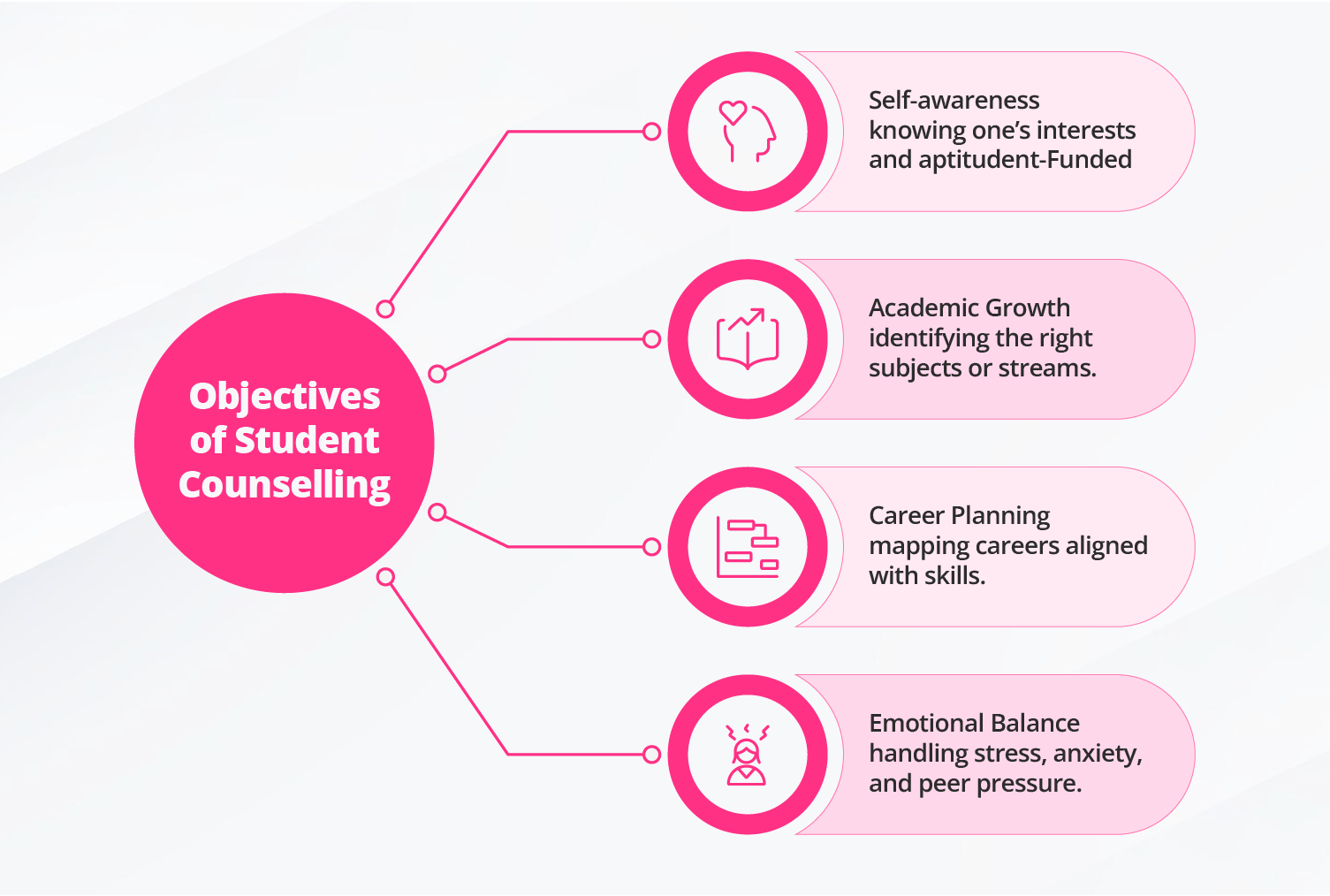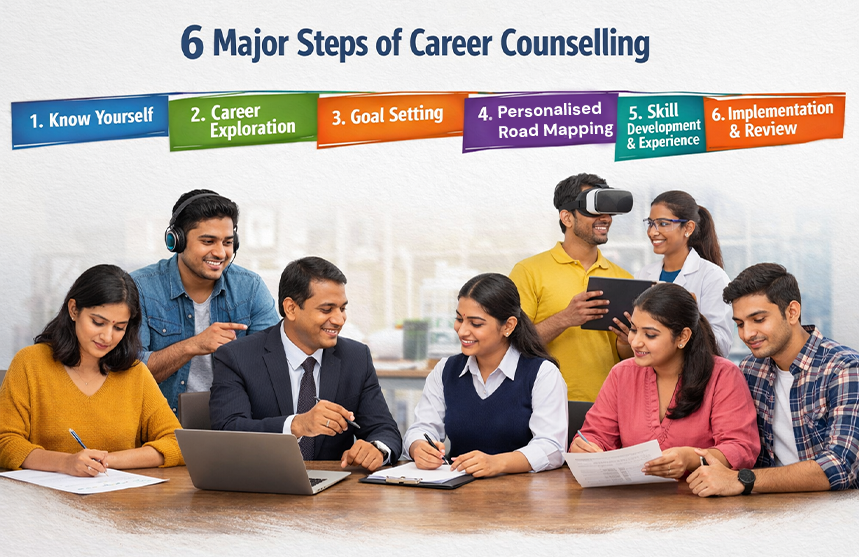7 Reasons You Need Free Career Counselling After 12th
Why Student Counselling Matters?

Imagine this: After 10th, you pick Science stream, because all your friends were taking. Post completion of your high school, you take a random entrance exam because that’s what society was expecting of you. Once the cut offs and grade 12th results came, you realise there’s hardly any good college left for you and your parents don’t have enough money to fund your education through a private college. You end up picking a college nearby and for the sake of it you waste your three potential years of your life pursuing a degree that couldn’t even get you a job. From following one field to going with the flow by following the trend, you now have a scattered resume but there is not only thing that you can do the best because you don’t really know what your true potential is. The wors of all? You are not even following your passion because you don’t know how to turn it into your ultimate profession.
To students who go through the struggle of not knowing, you aren’t weak, you are just confused. Amidst all the wonderful career options that lay in front of you, deciding which one of them is the best suited path for you can be a little challenging. As you look for the right field to follow, it is only student counselling that can help you know who you truly are. Today, in this blog, we are going to share why student counselling matters, what it really is, and how it is shaping futures. So, without further ado, let’s get to the point.
What is Student Counselling?
As per a recent report by The Indian Express, 40% students don’t even know what student counselling is let alone benefitting from that to brighten their future. As confusion seeps you whole, knowing what your career options are is important before you start regretting your decisions.
Being a young lad of 16 or 18 years, you might not know what your future options are. And while other noises are there to confuse you, it is only the student counselling experts who calms your never, show you the right path, and ensures you make informed decisions for your future.
Student counselling is a structured process that focuses on guiding students in different aspects of their lives like academic, personal, emotional, and career related. While all the confusion may lead you to doubt yourself and think small of yourself, it is only the student counselling experts who make you realise your worth.
The student counselling experts use various tools like the psychometric test, one-on-one counselling sessions, or personalised counselling to help students discover their strengths, weaknesses, areas of interest, and what their future may look like. Based on the analysis of the Psychometric Test and one-on-one counselling sessions, the counsellors suggest academic paths, career options, and personal development strategies that suits students the best.
As the overview of student counselling ends here, now let’s move to know the objective of student counselling.
What is the Objective of Student Counselling?
When you don’t know about something, the fear of availing it is serious. As you are not sure of what student counselling is, here we are sharing the objective of student counselling. The main purpose of student counselling is to help students understand themselves and their environment so they can make choices that lead to growth and satisfaction. Here’s a quick glimpse of the objective of student counselling.

Types of Student Counselling
Children are fragile and one never knows what might pinch them. A scar of today can be a fear of tomorrow, so to help students stay at ease and to be with them at all times, there are student counselling sessions available. Student counselling is a combination of various counselling catered under the same umbrella. To make sure no individual doubt themselves, regret their decisions, and have a way out of every situation, the student counselling experts are here to help.
Here is a list of types of student counselling.
- Academic Counselling: The first type of student counselling available to guide students know what are the right academic decisions for them is academic counselling. As the name suggests, in this, the counsellors help students choose the right subjects, courses, and study paths.
- Career Counselling: The next type of student counselling is career counselling where the counsellors focus on long-term goals and future career aspects. This type of counselling help individuals understands their right potential, skills, and strengths; and align them with the best fit career options.
- Personal & Emotional Counselling: Another common type of student counselling is personal and emotional counselling. As the name suggests, this type of counselling deals with stress, anxiety, and adjustment issues, in short, the emotional or mental distress that students go through.
- Group Counselling: The last type of student counselling is group counselling and by the name you must have got the hint that this type of counselling is conducted for a group like for school or college students altogether. Issues that are addressed in this counselling includes exam stress, communication skills, and career awareness.
Benefits of Student Counselling
Now it’s time to see why student counselling matters and why you must take the same too.
1. Self-awareness and Clarity
There are thousands of career options available, but when you don’t know what is good for you, you might end up taking a path that is not the right fit for you. The wrong decisions today might lead you to regret your decisions 20 years down the lane. To ensure you make informed career decisions and have clarity about what you want to be in life, it is the student or career counselling experts helping you with. With the help of a psychometric test and personalised counselling sessions, the counselling experts make you understand your true potential, strength, skills, and career options ensuring to give you clarity and make you self-aware.
2. Academic Improvement
The next benefit of student counselling is improved academic performance. Not every student is built the same. While some are good at maths, other can be the tech ninja, or final solace in literature. For every student the academic path is different but due to peer or societal pressure, students end up taking what others expect from them. This is where student counselling comes to rescue. The counsellors understand what your true potential is and based on that they suggest you what are the right subjects for you, how you can manage the exam stress, what courses you must pursue, and which degree will be ultimate for you.
3. Career Direction and Goal Setting
One of the best benefits of student counselling is that you get career clarity after investing your time in counselling sessions. Once you have taken the psychometric test and have clearly communicated your career options with the counsellors, they lay out the best fit career options for you, and this gives you clarity in life. Instead of making random career choices, you get a chance to make informed career decisions. The counsellors provide you information about emerging career options, educational requirements, and job market trends, enabling you to plan ahead accordingly.
4. Emotional and Mental Well-being
Not knowing what to be in life or what to do next can be a big stress for you. Seeing everyone else pursuing a career in different fields and here you are with no clue of what your future looks like can give you anxiety. Above all the pressure of parents, peers, and society can take a big toll on your mental health. As you go through a lot of emotional and mental roller-coaster, it is the student counselling experts who aim to make you confident by enlightening you about your strengths, skills, and potential. By providing you clarity, the counsellors fill you with confidence, eliminating the risk of stress and anxiety.
5. Career Road Mapping for Life
One of the greatest advantages of career counselling or student counselling is you get a personalised roadmap for the rest of your life. Once the counsellors have understood your expectations and ambitions, they help you create a roadmap backwards. After deciding what you want to become, the counsellors then suggest you which degree you must have, what experience you must obtain along the way, what skills will suit you the best, and at last what should be your short- and long-term goals. This overall helps you reduce tension and make confident, informed decisions about your career without having to listen to outer voices.
MetaApply Career Counselling- Your Trusted Counsellor
As you got an overview of what student counselling is, now you must be willing to connect with such career counselling experts. Your one such trusted partner is MetaApply Career Counselling. Whether you are a grade 8th student willing to explore various fields in early days of high school or a grade 10th student struggling with the right stream to pick after 10th or even a grade 12th student wondering which entrance exam may suit you the best. No matter what you struggle, and stress is at the moment, it is with MetaApply IE hat you are going to get the right counselling in life.
So, don’t let pressure and stress win over your passion. Connect with MetaApply Career Counselling experts today and get your academic and career advice at the earliest opportunity.
Frequently Asked Questions
Student counselling is a professional guidance process that helps students understand their strengths, interests, and emotions. It supports them in making informed academic, personal, and career decisions while promoting self-awareness, confidence, and emotional well-being for overall personal and educational growth.
The main purpose of student counselling is to provide clarity, direction, and emotional support. It helps students identify their potential, overcome challenges, and make confident decisions regarding studies, careers, and life goals, ensuring balanced personal and academic development.
The student counselling process includes assessment through psychometric tests, personal discussions to understand goals, analysis of results, creating an individualised action plan, and regilar follow-up sessions. These steps ensure ongoing guidance, progress tracking, and effective decision-making for the students’ growth.




















